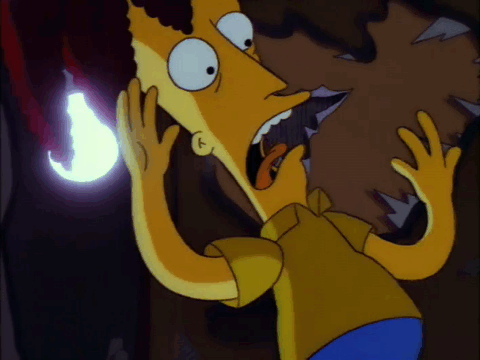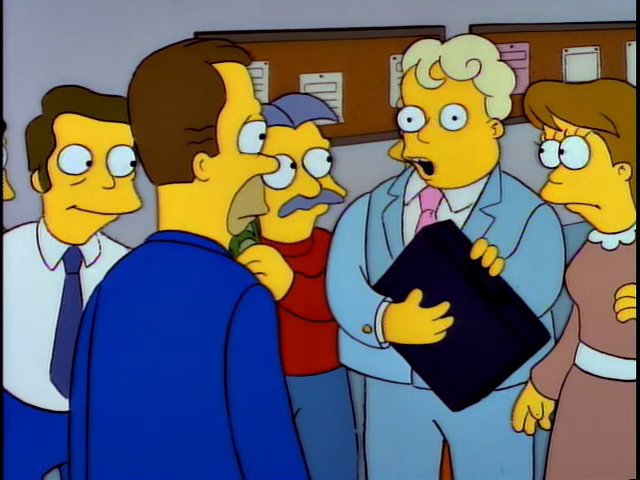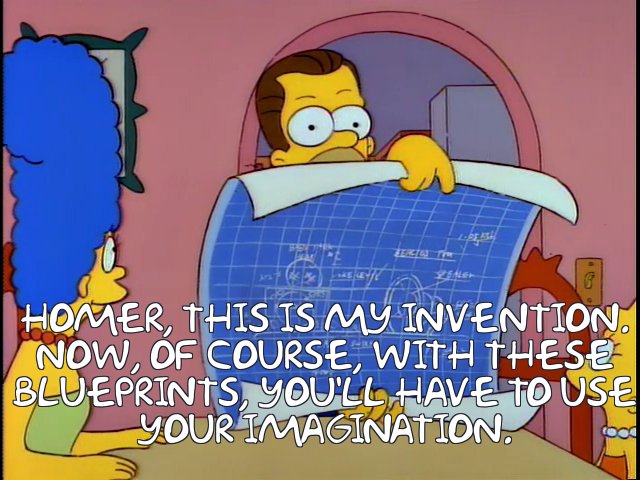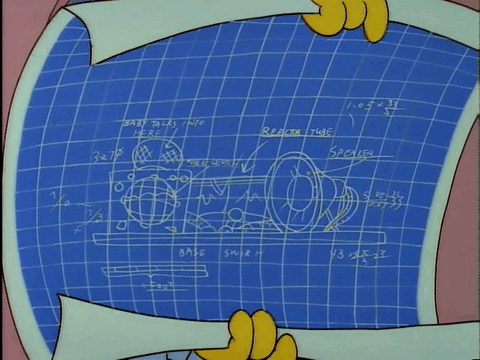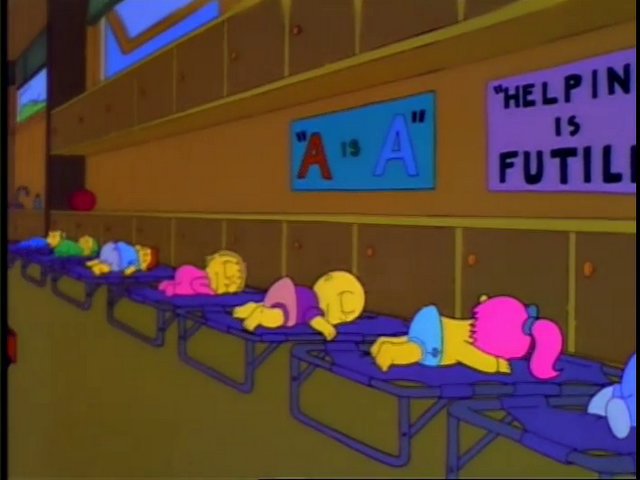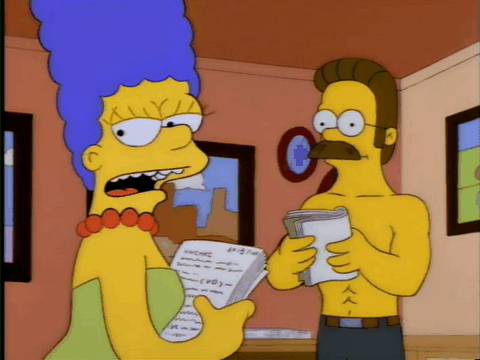Johnny Unusual
(He/Him)
Colonel Homer
I used to be one of those kids who was pretty snotty about country music. Its still not my preferred genre, but I've definitely come around on it over the years and enjoy the music of Willie Nelson, Johnny Cash and Dolly Parton. My tastes do tend to be more old school, granted. Now most of the mainstream country that appears on country radio stations isn't for me, having a sound I don't find engaging and subjects such as pick up trucks and... uh, miscellaneous that doesn't speak to me. "ike I'll borrow random CDs from the library and whenever I pick up a modern country one, way too many songs contain pick up trucks. I get that those things are pretty big in a lot of people's lives but it feels like the degree to which they are used is very pander-y. But I've learned to love a lot of the country sound, and respect that there's a lot going on. And rewatching this episode, I was surprised how great the songs in this episode are.
In this episode, Homer gets angry after Marge yells at him in the theatre and Homer drives off to blow off steam. Eventually he ends up in a redneck bar where he sees Lurleen Lumpkin, the bar's waitress, perform. The song speaks to Homer and he can't get it out of his head. While he gets her to record a version for him, she's discovered and slowly becomes a superstar thanks to her talent and makes Homer her manager. Homer loves the chance to make Lurleen the star she deserves to be but the new arrangement drives a wedge between Homer and Marge, who is upset that Homer is spending most of his free time with another woman. And she should be, as Homer is very slow to realize Lurleen is in love with him. Soon Homer must make a choice between supporting Lurleen and returning to his family.
Man, this is a good episode. This is yet another episode that completely hits all the bases: emotionally strong, well-told and very funny. And its clear while it is taking the piss out of the country music scene, it is clear there's a love for the genre and tropes. Interestingly, this is the only episode Matt Groening has written solo but after watching it, it is a shame he didn't write more. According the wikipedia, the episode started with the germ of "Homer must choose between fame and fortune and his family", which is a good plot (and one that will happen in episodes like Homerpalooza) but that's not what this episode ended up being and I think its stronger for it.
The struggle between Homer and Marge is an interesting one in this episode. Marge is understandably annoyed while Homer obnoxiously won't shut up during a dull-looking Tom Clancy thriller and ends up blowing up at him to cheers from the rest of the audience. When Homer reveals he's helping Lurleen, Marge is understandably upset that he's both fixated on her (even though for most of the episode its platonic from his end) and that he's spending so much time with her. Meanwhile Homer sees this sweet, humble girl who seems unappreciated who wrote a song that makes him appreciated and he wants to share her with the world. He never thinks of her romantically (which leads to some good comedic beats based on his obliviousness that makes the often jerky Homer seem really sweet) but the fact that he continues the arrangement even after Marge states outright "I don't like this and what it means in our marriage", which is also in its own way selfish. There's no wholly bad motive in the episode and even the increasingly romantically aggressive Lurleen is never anything less than sympathetic and likable. Its really about Homer learning to walk away from something that means a lot to him for the sake of his family. It isn't fame and fortune, its his relationship with Lurleen and all the rewards that brings emotionally.
And holy shit, I forgot how good Beverly D'Angelo is in this. I would put her in the top 10 guests on the show easily after this rewatch. There's something in the writing too, but the show has to sell that she would fall in love with Homer and make it feel less like a plot point and more organic. But I feel Beverly makes her more than "lady who moons over Homer", even though that's a lot of what she has to do in the episode. She's sweet and really turns on the charm, whether that charm be romantic or simply as a performer. Apparently the staff worked really hard to make her sexy by Simpsons standards (partially by removing the classic overbite) but Beverly also makes her feel lived in and her singing is incredible. The "Bunk With Me Tonight" section truly is a great romantic moment.
As for Homer, I also think the episode does a good job balancing his genuine good intentions with some of the thoughtless stuff he does. His motives are pure: he simply is moved by some music and wants to share it with the world. Its only once he finally figures out how she feels about him does he have his doubts and he *mostly* never entertains anything else (though he can't help being curious when he walks out the door. Can't blame him.) Though the big kiss in the climax he's embracing her before he pushes her away, which is an interesting choice considering their relationship everywhere else in the episode. One of my favourite elements of his oblivious is this tiny bit of body language: Homer is still oblivious but he's polite.
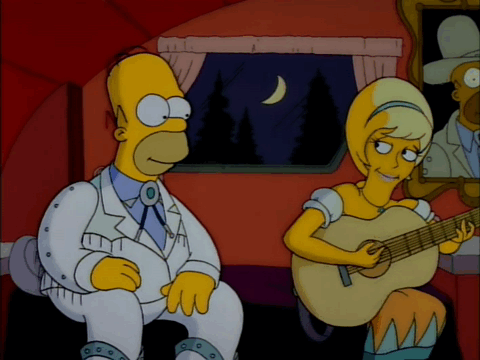
Though its clear when the fog in his brain is lifted and he realizes how Lurleen feels, its clear he's certainly not unresponsive to her affections but for most of the episode, the purity of his motives make his actions in the episode pretty forgivable, especially when it gives a woman a chance to become a star. Apparently the other writers and crew were worried that Homer would seem like too much of a jerk in this episode but I feel this is one where he seems less jerky than usual, even if he is unwittingly neglecting his marriage. I also love that Homer is someone so used to being dumped on, there are two jokes in the episode where Homer's response show's he's incredulous that he's being complimented.
"Oh, Homer, you're just a big old sack of sugar."
"Thanks. You did say sugar, right?"
"Homer, you're as smart as you are handsome."
"HEY! Oh, you meant that as a compliment."
Though this isn't the first rando new job Homer has gotten, this does make it feel like he could get a new job any episode when the writers felt like it. But it also is one of the episode's that endangers the Homer and Marge marriage with romantic rival for Marge. It would be a well the show would return to more than once, particularly with the hilarious "The Last Temptation of Homer" but this might be the strongest thanks in no small part to the character of Lurleen. They would return to the character but like a lot of the later season returns, the impact would never be as strong as it is here.
Jokes I missed before:
Later in the episode
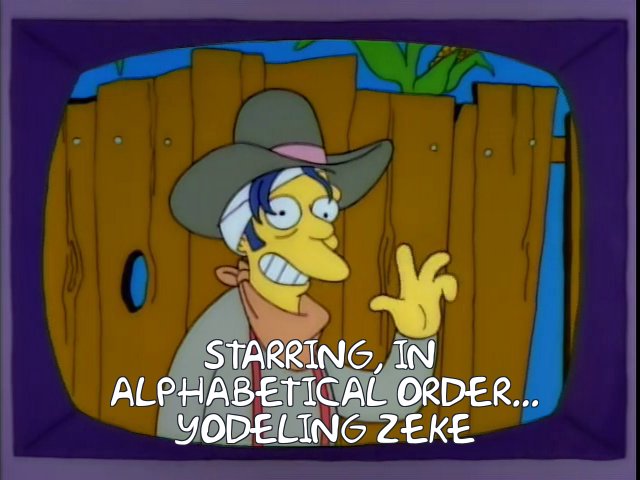
Other great bits:
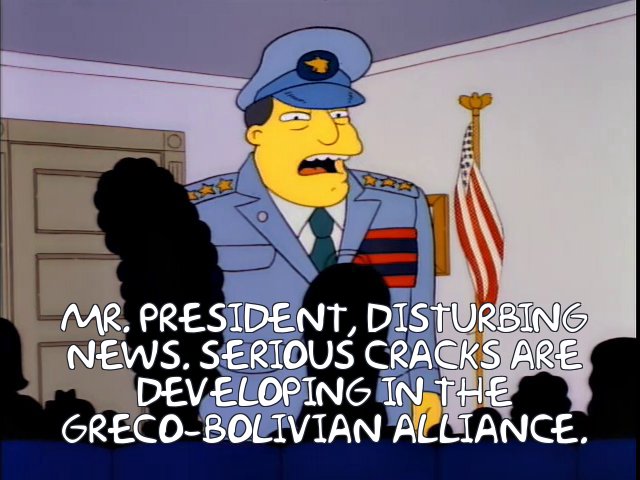
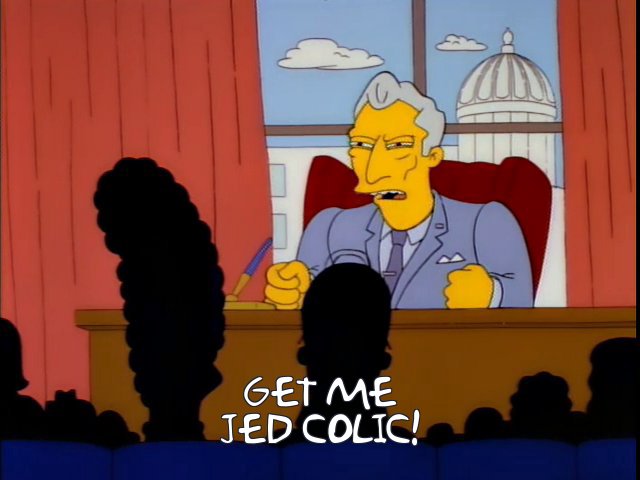
Homer giving WAY too long time to consider Lurleen appearing on the radio.
Also the first appearance of the "Homer's boyhood dream" bit. I know there was more than one in the formula of Homer claiming something is his boyhood dream and Marge pointing to a previously claimed boyhood dream that he'd actually accomplished.
"You bitter?"
"Yep. Bit him too."
"HAHAHAHAHAHA-- *with sudden reverence and seriousness* And now, once again, Lurleen"
I used to be one of those kids who was pretty snotty about country music. Its still not my preferred genre, but I've definitely come around on it over the years and enjoy the music of Willie Nelson, Johnny Cash and Dolly Parton. My tastes do tend to be more old school, granted. Now most of the mainstream country that appears on country radio stations isn't for me, having a sound I don't find engaging and subjects such as pick up trucks and... uh, miscellaneous that doesn't speak to me. "ike I'll borrow random CDs from the library and whenever I pick up a modern country one, way too many songs contain pick up trucks. I get that those things are pretty big in a lot of people's lives but it feels like the degree to which they are used is very pander-y. But I've learned to love a lot of the country sound, and respect that there's a lot going on. And rewatching this episode, I was surprised how great the songs in this episode are.
In this episode, Homer gets angry after Marge yells at him in the theatre and Homer drives off to blow off steam. Eventually he ends up in a redneck bar where he sees Lurleen Lumpkin, the bar's waitress, perform. The song speaks to Homer and he can't get it out of his head. While he gets her to record a version for him, she's discovered and slowly becomes a superstar thanks to her talent and makes Homer her manager. Homer loves the chance to make Lurleen the star she deserves to be but the new arrangement drives a wedge between Homer and Marge, who is upset that Homer is spending most of his free time with another woman. And she should be, as Homer is very slow to realize Lurleen is in love with him. Soon Homer must make a choice between supporting Lurleen and returning to his family.
Man, this is a good episode. This is yet another episode that completely hits all the bases: emotionally strong, well-told and very funny. And its clear while it is taking the piss out of the country music scene, it is clear there's a love for the genre and tropes. Interestingly, this is the only episode Matt Groening has written solo but after watching it, it is a shame he didn't write more. According the wikipedia, the episode started with the germ of "Homer must choose between fame and fortune and his family", which is a good plot (and one that will happen in episodes like Homerpalooza) but that's not what this episode ended up being and I think its stronger for it.
The struggle between Homer and Marge is an interesting one in this episode. Marge is understandably annoyed while Homer obnoxiously won't shut up during a dull-looking Tom Clancy thriller and ends up blowing up at him to cheers from the rest of the audience. When Homer reveals he's helping Lurleen, Marge is understandably upset that he's both fixated on her (even though for most of the episode its platonic from his end) and that he's spending so much time with her. Meanwhile Homer sees this sweet, humble girl who seems unappreciated who wrote a song that makes him appreciated and he wants to share her with the world. He never thinks of her romantically (which leads to some good comedic beats based on his obliviousness that makes the often jerky Homer seem really sweet) but the fact that he continues the arrangement even after Marge states outright "I don't like this and what it means in our marriage", which is also in its own way selfish. There's no wholly bad motive in the episode and even the increasingly romantically aggressive Lurleen is never anything less than sympathetic and likable. Its really about Homer learning to walk away from something that means a lot to him for the sake of his family. It isn't fame and fortune, its his relationship with Lurleen and all the rewards that brings emotionally.
And holy shit, I forgot how good Beverly D'Angelo is in this. I would put her in the top 10 guests on the show easily after this rewatch. There's something in the writing too, but the show has to sell that she would fall in love with Homer and make it feel less like a plot point and more organic. But I feel Beverly makes her more than "lady who moons over Homer", even though that's a lot of what she has to do in the episode. She's sweet and really turns on the charm, whether that charm be romantic or simply as a performer. Apparently the staff worked really hard to make her sexy by Simpsons standards (partially by removing the classic overbite) but Beverly also makes her feel lived in and her singing is incredible. The "Bunk With Me Tonight" section truly is a great romantic moment.
As for Homer, I also think the episode does a good job balancing his genuine good intentions with some of the thoughtless stuff he does. His motives are pure: he simply is moved by some music and wants to share it with the world. Its only once he finally figures out how she feels about him does he have his doubts and he *mostly* never entertains anything else (though he can't help being curious when he walks out the door. Can't blame him.) Though the big kiss in the climax he's embracing her before he pushes her away, which is an interesting choice considering their relationship everywhere else in the episode. One of my favourite elements of his oblivious is this tiny bit of body language: Homer is still oblivious but he's polite.

Though its clear when the fog in his brain is lifted and he realizes how Lurleen feels, its clear he's certainly not unresponsive to her affections but for most of the episode, the purity of his motives make his actions in the episode pretty forgivable, especially when it gives a woman a chance to become a star. Apparently the other writers and crew were worried that Homer would seem like too much of a jerk in this episode but I feel this is one where he seems less jerky than usual, even if he is unwittingly neglecting his marriage. I also love that Homer is someone so used to being dumped on, there are two jokes in the episode where Homer's response show's he's incredulous that he's being complimented.
"Oh, Homer, you're just a big old sack of sugar."
"Thanks. You did say sugar, right?"
"Homer, you're as smart as you are handsome."
"HEY! Oh, you meant that as a compliment."
Though this isn't the first rando new job Homer has gotten, this does make it feel like he could get a new job any episode when the writers felt like it. But it also is one of the episode's that endangers the Homer and Marge marriage with romantic rival for Marge. It would be a well the show would return to more than once, particularly with the hilarious "The Last Temptation of Homer" but this might be the strongest thanks in no small part to the character of Lurleen. They would return to the character but like a lot of the later season returns, the impact would never be as strong as it is here.
Jokes I missed before:

Other great bits:


Homer giving WAY too long time to consider Lurleen appearing on the radio.
Also the first appearance of the "Homer's boyhood dream" bit. I know there was more than one in the formula of Homer claiming something is his boyhood dream and Marge pointing to a previously claimed boyhood dream that he'd actually accomplished.
"You bitter?"
"Yep. Bit him too."
"HAHAHAHAHAHA-- *with sudden reverence and seriousness* And now, once again, Lurleen"
